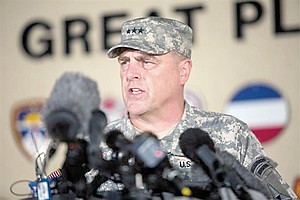Fort Hood gunman sought mental help
The Western News | UPDATED 11 years, 8 months AGO
FORT HOOD, Texas — An Iraq War veteran being treated for mental illness was the gunman who opened fire at Fort Hood, killing three people and wounding 16 others before committing suicide, in an attack on the same Texas military base where more than a dozen people were slain in 2009, authorities said.
Within hours of the Wednesday attack, investigators started looking into whether the man’s combat experience had caused lingering psychological trauma. Fort Hood’s senior officer, Lt. Gen. Mark Milley, said the gunman had sought help for depression, anxiety and other problems.
Among the possibilities investigators planned to explore was whether a fight or argument on the base triggered the attack.
“We have to find all those witnesses, the witnesses to every one of those shootings, and find out what his actions were, and what was said to the victims,” said a federal law enforcement official who spoke on condition of anonymity, because he was not authorized to discuss the case by name.
The official said authorities would begin by speaking with the man’s wife, and expected to search his home and any computers he owned.
The shooter was identified as Ivan Lopez by Texas Rep. Michael McCaul, chairman of the House Homeland Security Committee. But the congressman offered no other details, and the military declined to identify the gunman until his family members had been notified.
Lopez apparently walked into a building Wednesday afternoon and began firing a .45-caliber semi-automatic pistol. He then got into a vehicle and continued firing before entering another building, but he was eventually confronted by military police in a parking lot, according to Milley, senior officer on the base.
As he came within 20 feet of an officer, the gunman put his hands up but then reached under his jacket and pulled out his gun. The officer drew her own weapon, and the suspect put his gun to his head and pulled the trigger a final time, Milley said.
The gunman, who served in Iraq for four months in 2011, had been undergoing an assessment before the attack to determine if he had post-traumatic stress disorder, Milley said.
He arrived at Fort Hood in February from another base in Texas. He was taking medication, and there were reports that he had complained after returning from Iraq about suffering a traumatic brain injury, Milley said. The commander did not elaborate.
The gunman was never wounded in action, according to military records, and there was no indication the attack was related to terrorism, Milley said. His weapon had been recently purchased in the local area and was not registered to be on the base, Milley said.
Those injured were taken to the base hospital and other local hospitals. At least three of the nine patients at Scott & White Memorial Hospital in Temple were listed in critical condition.
Wednesday’s attack immediately revived memories of the 2009 shooting rampage on Fort Hood, the deadliest attack on a domestic military installation in U.S. history. Thirteen people were killed and more than 30 were wounded.
Until an all-clear siren sounded hours after Wednesday’s shooting began, relatives of soldiers waited anxiously for news about their loved ones.
“The last two hours have been the most nerve-wracking I’ve ever felt,” said Tayra DeHart, 33, who had earlier heard from her husband that he was safe but was waiting to hear from him again.
Brooke Conover, whose husband was on base at the time of the shooting, said she found out about it while checking Facebook. She immediately called her husband, Staff Sgt. Sean Conover.
“I just want him to come home,” she said.

